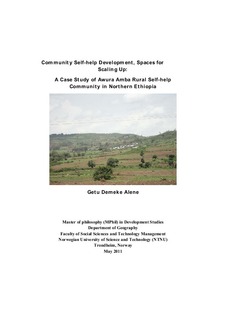| dc.description.abstract | By positioning within an alternative development and agency/actor-oriented perspectives, and by employing diverse qualitative research methods, this study examines the dynamics of community self-help development and scaling up. The study investigates the processes and factors that contribute to successful community self-help development that leads to community capacity and empowerment. The diverse processes, through which poor people, through their individual and collective agency, strategize their actions, resist and negotiate with other stakeholders is emphasised. Community’s own mobilization for self-management, based on the networks of self-help groups; trusted leadership drawn from community members with excellent mobilization skill to spark community’s own mobilization for empowerment; poor people’s collective agency; trust that builds community and promotes collective actions; genuine participation within the community, which is realized because of planned and spontaneous interaction among intimate, small groups of people; and outside supports from government and NGOs, based on the bottom up proposals of communities are the main processes and elements of successful community self-help development. On the other hand, the study has shown that the scaling up of such successful community self-help development in Ethiopia is constrained by unfavourable institutional arrangements within the government structures, lack of capacity and power among local governments and inescapable nominal and instrumental participation, rather than genuine participation to build local people’s capability. Methodological limitations and lack of awareness about the goal of scaling up within the existing replication efforts are other challenges of scaling up.
The researcher argues that the existing institutions and participatory practices may present opportunities for a gradual actualization of people’s agency, because the poor are capable of formulating new ways of strategizing and combining available resources in a new manner to solve problems. Thus, by using the available, small opportunity and systematically combining with other grassroots development approaches, by emphasizing on small, intimate groups of people (community/village), alternative spaces of scaling up can be identified and used. | nb_NO |
